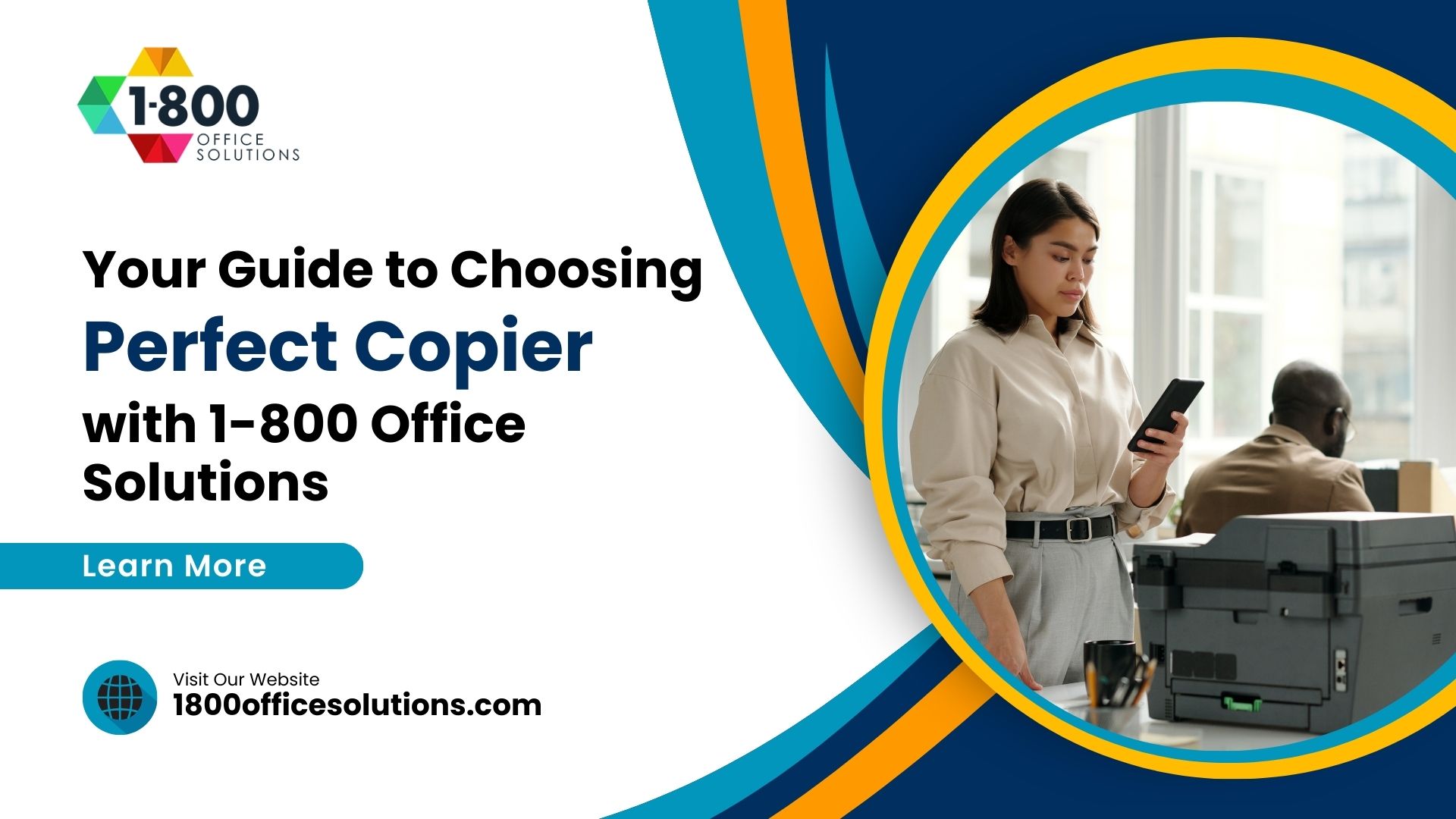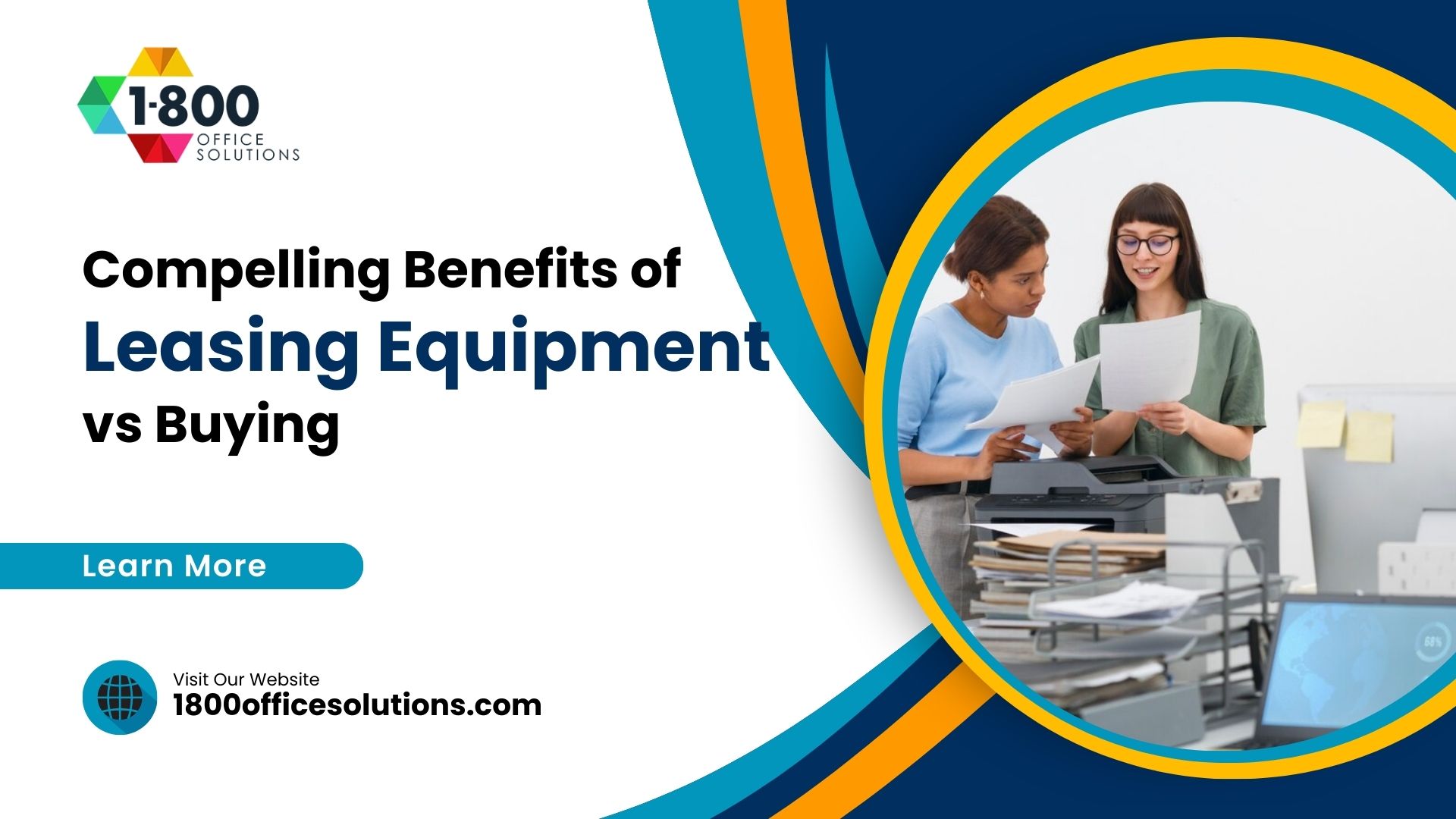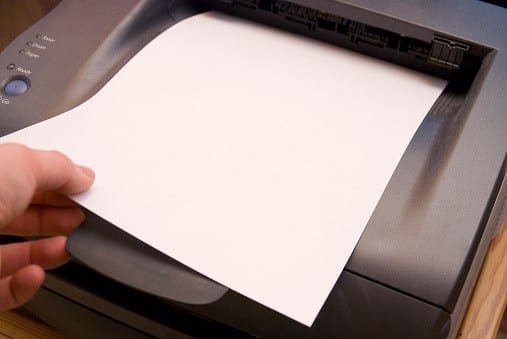Upgrading Copy Machine Lease: Can You Really Do It for Free?
Introduction to Upgrading Copy Machine Lease
In today’s fast-paced business environment, copier leasing has become an integral part of operational strategy. Companies often opt to lease a copier rather than purchase one, as it allows for regular upgrades to newer models and can be more cost-effective. However, the challenge of breaking free from a copier lease can be daunting. Whether it’s due to the need for a new copier or dissatisfaction with the current lease agreement, understanding the complexities of copier leasing is essential.
In this blog post you’ll learn upgrading copy machine lease and how the copier lease agreement works. Moreover, 1800 Office Solutions provides your free quote and comprehensive guide on leasing a copier machine.
What Is A Copier Lease Agreement?
A Copier Lease Agreement is a binding contract that outlines the terms and conditions for leasing a copy machine. It defines the responsibilities of both parties, including maintenance, monthly payment, and the option to purchase the copier at the end of the lease.
- Smart Copy Agreements: These agreements combine the lease and service into one contract, simplifying billing. They are often preferred by businesses with multiple locations but can be restrictive if you want to change service providers.
- Fair Market Value (FMV) Lease: FMV Leases separate the lease from the service agreement, offering more flexibility but potentially more administrative work. Understanding the Pros & Cons of Short-Term Copier Rental can help in choosing the right type of lease.
Why Do Copier Service Costs Go Up?
The cost of maintaining a copier can increase over time for several reasons:
- Wear and Tear of the Machine: As a copier gets older, its parts wear down, leading to more frequent maintenance and repairs. This wear and tear can result in higher service costs, making it essential to consider when to upgrade.
- Replacement of Old Parts: Older copiers may require parts that are more expensive or harder to find. Upgrading to a new copier might be more cost-effective, as maintaining an older machine can become increasingly expensive.
What Should You Check Before Breaking Your Copier Lease?
Before attempting to break a copier lease, it’s crucial to understand several key aspects:
- Breach of Contract Considerations: Analyzing the lease agreement for any clauses that might penalize you for early termination is vital. Understanding the legal implications can save you from unexpected costs.
- Automatic Renewal Clauses: Some agreements include automatic renewal, extending the lease without your consent. Knowing the cancellation procedure is essential to avoid unexpected renewals at the end of your lease.
- Early Termination Fees: Being aware of any fees associated with ending the lease early is crucial. These fees can be substantial and must be considered in your decision to break the lease.
Six Ways To Get Out Of A Copier Lease
Breaking a copier lease can be complex, but there are strategies to consider:
- Reviewing Cancellation Conditions: Examine the lease for specific cancellation terms, including any penalties or fines for early termination. Understanding these conditions can guide your decision-making process.
- Analyzing Helpful Clauses: Look for clauses that might allow for termination under certain conditions, such as provider negligence or failure to meet performance guarantees. These clauses can provide legal grounds for breaking the lease.
- Paying Off the Lease Amount: Paying the remaining balance on the lease may allow you to sell the equipment to recover some costs. It’s a direct approach that requires careful financial consideration.
- Checking for Assumption Clauses: Some leases allow for sub-leasing or transferring the lease to another party. This option can relieve you of the agreement but requires finding a suitable third party.
- Lease Transfer (Copier Lease Buyout): Negotiating a lease transfer with a new dealer can facilitate a smooth transition to a new lease. It requires collaboration with both the old and new leasing companies.
- Negotiating for Early Lease Termination: As a last resort, you may negotiate with the leasing company for early termination. This approach may incur fees or other penalties but can be an effective way to end a problematic lease.
When Is A Good Time To Break Your Copier Lease?
Determining the right time to break a copier lease requires careful consideration:
- Maintenance Pricing Considerations: If maintenance costs are rising and you can find a machine with a lower cost per page, it might be time to consider a new lease.
- Business Upgrading Needs: If your business is expanding and requires a larger, high-volume copy machine, breaking the lease might be a wise decision.
- Competitor Pricing: Discovering that competitors are paying less for similar leases can prompt a reassessment of your current lease.
- Unfair Agreement Realization: If you realize that you’ve signed an unfair agreement, seeking legal advice and potentially breaking the lease may be necessary.
- Automatic Renewal Issues: Being aware of automatic renewal clauses and timing your decision to break the lease accordingly can prevent unwanted extensions of the lease.
Understanding the nuances of copier leasing, from the types of agreements to the reasons for upgrading or terminating a lease, is essential for businesses to make informed decisions. Whether you’re entering a fresh lease or considering breaking an existing one, thorough knowledge and careful planning can lead to a successful copier leasing experience.
The decision to lease or upgrade a copier is not one to be taken lightly, and a comprehensive understanding of the associated costs, terms, and potential challenges is crucial for success.
Practical Steps to Break a Copier Lease
What To Do If You Decide To Break Your Copier Lease?
Breaking a copier lease is a significant decision that requires careful planning and execution. Here’s a step-by-step guide to help you navigate this process:
- Informing the Leasing Company: As soon as you decide to break your copier lease, it’s essential to inform the copier leasing company. Open communication ensures that both parties understand the situation and can work together to find a solution.
- Canceling Automatic Renewal: Many copier lease agreements include automatic renewal clauses. If you want to end your current lease, you must cancel this provision. Failure to do so may result in the lease being extended without your consent.
- Preparing for Early Termination Fees: Breaking a copier lease early often comes with fees. Understanding these costs and preparing for them is crucial. It may include paying the remaining lease payment or other penalties as outlined in the service agreement.
- Consulting a Lawyer: If you’re unsure about the legal aspects of breaking the lease, consulting a lawyer who specializes in office equipment leases can be beneficial. They can review the copier lease agreement and advise you on the best course of action.
- Documenting Everything: Keeping detailed records of all communications and actions related to breaking the lease is vital. It includes emails, letters, and any agreements made with the copier provider. Documentation can protect you in case of disputes.
- Considering the Benefits of Leasing: Before breaking the lease, evaluate the benefits of leasing a copy machine versus purchasing a copier. Understanding the advantages of leasing and how it aligns with your business needs can guide your decision.
- Evaluating the Type of Copier: Assessing the type of copier or multifunction copier you have and its suitability for your business can also influence your decision. If you choose to lease, ensure that the new machine meets your requirements.
- Understanding the Total Cost: Breaking a lease may involve costs beyond early termination fees. It may include the cost to return the machine to the location provided by the leasing company. Understanding the total cost is essential for informed decision-making.
- Exploring Options to Upgrade Your Copier: If the reason for breaking the lease is to upgrade to a new copier, explore options with your current leasing company. They may offer incentives or assistance in transitioning to a newer machine.
- Assessing Business Insurance: Check with your business insurance provider to understand any implications of breaking the lease. Insurance may cover certain costs or require specific actions on your part.
- Considering Leasing Instead of Buying: Weigh the pros and cons of leasing instead of buying. Leasing allows flexibility and access to the latest technology, while buying may offer more control and ownership.
Copier Machine Lease Termination Letter Sample
When breaking a copier lease, a formal termination letter is often required. Here’s why it’s essential and how to write one:
- Importance of a Termination Letter: A termination letter serves as a formal notice of your intention to end your copier lease. It provides a clear record and can prevent misunderstandings with the leasing company.
- How to Write a Termination Letter: The letter should include essential details such as the lease term, current copier lease information, reasons for termination, and any relevant clauses from the agreement. It should be professional and concise.
- Downloadable Sample Termination Letter: For your convenience, you can download a sample termination letter. It can be customized to fit your specific situation and helps ensure that you include all necessary information.
Breaking a copier lease is a complex process that requires careful consideration and planning. From understanding the type of lease and the benefits of leasing to preparing for potential costs and legal considerations, each step must be handled with attention to detail.
Whether you’re looking to upgrade your current machine or transition to a different office technology provider, following these practical steps can help you navigate the process successfully. It’s a decision that impacts not just the office’s high-quality equipment but also the financial and legal standing of the business.
Therefore, it’s a decision that must be made with thorough understanding and caution.
What People Also Ask
How do copier leases work?
Copier leases are contractual agreements between a business and a leasing company that allow the business to use a copier for a specified period, usually ranging from one to five years. The lease outlines terms such as monthly payments, maintenance responsibilities, and the option to purchase the machine at the end of the lease. Leasing provides flexibility to upgrade to a new machine without the upfront cost of purchasing.
What types of copier service agreements exist?
There are mainly two types of copier service agreements: Smart Copy Agreements and Fair Market Value (FMV) Leases. Smart Copy Agreements combine the lease and service into one contract, simplifying billing, while FMV Leases separate the lease from the service agreement, offering more flexibility. The choice depends on business needs and preferences.
Why do copier service costs go up?
Copier service costs can increase due to wear and tear of the machine and the need to replace old parts. As a copier ages, its components wear down, leading to more frequent maintenance and repairs. Older copiers may also require parts that are more expensive or harder to find, contributing to higher service costs.
What should you look for in your copier service agreement?
When reviewing a copier service agreement, pay attention to terms such as the lease duration, monthly payments, maintenance responsibilities, early termination fees, and automatic renewal clauses. Understanding these terms can help you avoid unexpected costs and ensure that the agreement aligns with your business needs and expectations.
How can you avoid copier rental traps?
Avoiding copier rental traps involves careful review of the lease agreement, understanding all terms and conditions, and being aware of potential pitfalls such as hidden fees, automatic renewal clauses, and restrictive terms. Consulting with a legal expert or an experienced office technology provider can also help you navigate the complexities of copier leasing and avoid common traps.
Conclusion
Navigating the world of copier leasing can be complex, but understanding the key aspects can make the process smoother and more beneficial for your business. From recognizing the different types of copier service agreements to being aware of why service costs might increase, and knowing the practical steps to break a lease, each element plays a vital role in a successful copier leasing experience.
For those entering a lease agreement for the first time, it’s essential to consult with experienced professionals, whether it’s a legal expert or a reputable copier provider. They can guide you through the terms and conditions, helping you avoid common pitfalls and ensuring that the agreement aligns with your business needs.
Emphasizing the importance of reading contracts carefully cannot be overstated. Every clause, every term, and every condition in the contract can have implications for your business. Understanding these details before signing can save you from unexpected costs and legal challenges down the line.
In the end, whether you’re looking to lease a copier for the first time or considering breaking an existing lease, thorough knowledge, careful planning, and attention to detail are your best allies in making informed and successful decisions.












